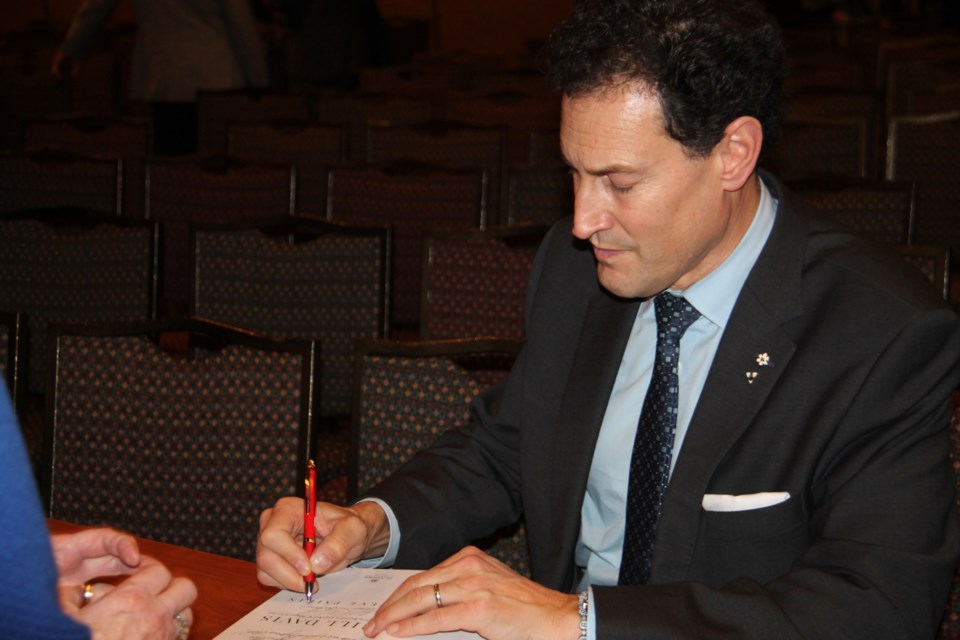A well-known, well-respected Canadian journalist visited Sault Ste. Marie Monday to share his insights into the life and career of former Ontario Premier Bill Davis.
Steve Paikin appeared at Algoma’s Water Tower Inn & Suites to sign copies of his latest book, a biography entitled Bill Davis: Nation Builder, and Not So Bland After All.
Davis, Progressive Conservative Premier of Ontario from 1971 to 1985, is well-connected to Sault Ste. Marie.
Paikin said Davis, now 87, still speaks of Arthur Wishart, John Rhodes and Russ Ramsay, three former Sault MPPs who served in various cabinet positions during the years when the Progressive Conservatives dominated Ontario’s political landscape.
Paikin has worked in television, radio and print during his career, and has been a familiar face on TVOntario (TVO) since 1992, most recently as host of TVO’s current affairs program The Agenda With Steve Paikin since 2006.
The book comes from Davis’ own recollections of his life and career as shared with Paikin.
“I didn’t think a good book had ever been written about him (Davis), and having written four or five previous books on politics, I thought that was a gap I could fill, and his most formative years in politics were my most formative years growing up in the province,” said Paikin, a Hamilton native, speaking to SooToday.
“He became Premier when I was 10 and stayed Premier until I was 24, so for all those years, he was the man. There would have been no politician in Ontario I was more aware of than him.”
Before he became Premier, Davis, as the province’s education minister during the 1960s, established TVOntario (TVO) and the province’s community college system.
The TVO studio in which The Agenda With Steve Paikin is produced is called the William G. Davis Studio.
“He likes to say to me ‘Paikin, if not for me you would have been unemployed for the last 20 years.’”
Paikin said MPPs from the late 1970s have told him Ontario was never more democratic than when Davis led minority Progressive Conservative governments.
“Davis would go left to get NDP support on some bills, he would go right to get Liberal support on other bills, the opposition helped write the bills, it was a genuinely collegial time,” Paikin said.
The ‘not so bland after all’ phrase within the book’s title, Paikin said, stemmed from a media scrum in which a news reporter asked Davis ‘why do you run such a bland government?’
“Mr. Davis simply responded ‘bland works,’” Paikin recalled.
“He preferred, when the temperature got hot, to lower the temperature, he was very good at doing that.”
“The irony is a lot of the issues during his time as Premier were not bland at all, he was dealing with two recessions, he had the Constitution, full funding for separate schools was big, he had a lot of very big issues that were not bland at all.”
Davis strongly supported Pierre Trudeau’s ultimately successful attempt to patriate the Canadian constitution in the early 1980s while most premiers (and most of Davis’ own fellow Conservatives) bickered with Trudeau over constitutional issues.
That’s where the ‘nation builder’ part of the title applies, Paikin said.
“He was prepared to suffer an intense amount of criticism, mostly from the base of the Conservative party, which was appalled that he was getting as close to Pierre Trudeau on this issue that he did…because he genuinely believed it was the right thing to do.”
“There’s a story in this book, never told before, about how in a key moment in the process, when it all might have broken down and fallen apart…Davis makes a phone call to Pierre Trudeau,” Paikin said.
“Suffice it to say he saved the day.”
Paikin suggested Davis’ decision to step down as Premier left the Progressive Conservatives feeling lost, leading to the end of the 42-year-old Conservative dynasty in Ontario in 1985.
“I’d say, in terms of policy, the constitution with the Charter of Rights and Freedoms, and in terms of politics, winning four elections in a row (were his biggest achievements),” Paikin said.
Davis was the second-longest serving Premier in Ontario’s history.
Despite his list of achievements, there were controversies, Paikin said.
Many will remember Davis for rejecting calls for full funding for Catholic high schools in the early 1970s, then approving it in 1985.
“It’s an open question as to whether it was the right decision,” Paikin said.
“You can have great arguments even 30 years later about the advisability of extending full public funding to the separate school system…obviously Catholic supporters thought it was a great idea, a lot of other people in Ontario didn’t like that idea at all.”
What does Paikin think current Progressive Conservative leader Patrick Brown (and, for that matter, any political leader) can learn from Davis’ record as leader?
“I think Patrick Brown is already taking to heart some of the most significant lessons from the Davis days…I heard people tonight say Patrick Brown is a great listener, and that was one of Bill Davis’ great skills, he was a listener.”
“He could listen to competing interests in society and then come down with a position that he hoped hit the sweet spot, and more often than not, it did.”
Current Premier Kathleen Wynne and Davis, both former Ministers of Education, get along very well, Paikin told Monday’s audience.
Proceeds from the admission to Paikin’s appearance in the Sault Monday, plus corporate sponsorship, raised more than $12,000, which goes to the Sault’s THRIVE Child Development Centre.
